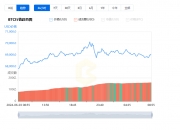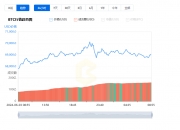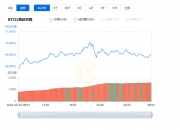DeFi,全称Decentralised Finance(去中心化金融),泛指一切以分布式账本与智能合约为技术基础的金融活动。我们知道,比特币一开始被设计出来,是具有明显的匿名抗审查特性的。要以这样一种技术来完成金融交易,首先要做的,就是在链上复现“信用”。
DeFi, fully known as Decentralized Finance, refers to all financial activities based on technology such as distributed books and smart contracts. We know that Bitcoin was originally designed with a distinct anonymous anti-censorship character. To complete financial transactions with such a technology, the first thing to do is to restore “credit” on the chain.
接下来,就容我非常唠叨地、从货币开始聊起。前三节属于闲聊,涉及到的内容较多,熟悉经济金融知识的朋友可以跳过。
And then, let me start with the money. The first three sections are chatting, and there's more to it, and friends who are familiar with economic and financial knowledge can skip.
货币起源与发展史等老生常谈的东西我就不说了。
I'm not going to say the usual things, such as the history of currency origin and development.
不知道大家有没有想过这么一个问题:世界GDP每年噌噌往上涨,这些财富都来自于哪里?
I wonder if anyone has ever thought of the question: where does the wealth come from when world GDP rises every year?
简简单单的一句话“劳动创造价值”无法做出解释。所谓的“劳动创造价值”,表现形式就是你用劳动获取报酬。那你的报酬又来自哪里?给你报酬的人,他的钱来自于哪里?
A simple phrase, “work creates value”, cannot be explained. What is called “work creates value”, in the sense that you are paid for it. Where does your pay come from? Who pays you, where does his money come from?
经济活动是无数道水流的循环,不考虑流通过程的损耗,要使其保持增长,一定需要一个持续性的水源。实际增长来源于生产出的物质增量,而名义上的增长,其水源就是印钞机。
Economic activity is a cycle of numerous streams of water, which, regardless of the loss of the circulation process, must require a sustainable source of water to sustain growth. Real growth comes from the increase in the amount of material produced, while nominal growth, the source of water, the printing machine, is.
举个简化的例子,假设去年手机3000元一个,工厂生产1000个,于是去年要买这些手机,就需要300万;今年工厂技术提升了,生产2000个手机,每个手机涨价到3200元,于是今年需要640万元。多出来340万元的钞票就需要印。
To give a simplified example, assuming that one cell phone last year was 3,000 and the factory produced 1,000, it would take 3 million to buy them last year; this year, the factory technology was upgraded to produce 2,000 mobile phones, with a price increase of $3,200 per cell phone, and $6.4 million this year. The extra $3.4 million in bills would need to be printed.
可是既然国家可以印钱,干嘛不多多益善?2020年美国GDP约21万亿美元,中国GDP15.6万亿美元,我再印个40亿人民币,岂不是就超过美国了?
But why not more if the country can print money? By 2020, the United States had about $21 trillion in GDP, China had 15.6 trillion in GDP, and I had four billion yuan to print than the United States.
当然不行,会通货膨胀的。
Of course not, it'll be inflation.
我们必须明确区分通货膨胀和一般物价上涨。
We must make a clear distinction between inflation and general price increases.
一般物价上涨,一般是因为供不应求;举例来说,手机、汽车刚被生产出来的时候,产能低下,但由于是新东西、又有切实需求,所以价格往往会很高,我记得十年前那种按键式的手机就得好几千。等到产能上去,供应上来了,价格自然下去了;十年后的我们,同样价格可以买到更物美价廉的手机,而按键式手机早被市场淘汰了。 而通货膨胀的原因在于钱印多了,货币贬值。
The general price rises, usually because of inadequate supply; for example, when mobile phones and cars are first produced, they are less productive, but because they are new and demand-driven, prices tend to be high, and I recall that the type of key-pressed cell phones were thousands of good 10 years ago. By the time they went up, the supply came up, and the price went down; 10 years later, we could buy more expensive mobile phones, while the key-press phone was already out of the market.
对应到手机的例子,今年640万元的总价中,300万是原有产量,(2000-1000)3000=300万是生产效率提高带来的新增产量,2000*(3200-3000)=40万是价格上涨带来的增量,这个40万所对应的,就是一般物价上涨。而假如印钞机印了1000万元的钞票,手机价格就不会停留在3200,可能会是5000,多出的部分就是通货膨胀。(过于简化,为了方便理解)
In the case of mobile phones, 3 million of this year’s $6.4 million total is the original production, 30 million = 3 million is the increase in production efficiency, and 2000* (3200-3000) = 400,000 is the increase in price, which corresponds to the general price increase. And if a banknote printing machine printed 10 million dollars, mobile phone prices would not remain at 32 million dollars, possibly 5,000, and the excess is inflation. (Extrasively simplified, for ease of understanding)
说到这里,你或许可以理解,印钱(货币产生名义增量)并不是一件坏事,但如果印得过多,超出实际生产生活所需的量,就会产生通货膨胀。因为多出的钞票无处可去,实际购买力会下降。
Speaking of which, you may understand that printing money (which produces nominal increases in money) is not a bad thing, but if it is too much to print, it can generate inflation, because the extra money is nowhere else to go, and the real purchasing power will decline.
为什么要多印钱呢?
Why print more money?
要理解这个问题,我们得先理解另外几个概念。一个是货币发行的主体,一个是货币的基本职能,一个是货币政策。一个一个来。
To understand this, we have to understand a few other concepts. One is the subject of currency issuance, one is the basic function of money, and one is monetary policy. One comes.
货币发行的主体。
The subject of the issue of the currency.
目前我们所说的货币基本上为各个国家发行的法币。据不可靠数据,世界上总共有180+种法币,其中50+可自由兑换。如果货币仅仅承担我们通常所说的商品交换一般等价物的职能,为什么会有不同的货币?假设不考虑空间限制,同一个东西用人民币买和用美元买有什么区别吗?反正购买行为发生的瞬间二者之间的汇率是不变的?
According to unreliable data, there are 180 + French coins in the world, of which 50 + are freely convertible. If money merely assumes what we usually call the function of exchanging generic equivalents of goods, why do currencies differ? If space restrictions are not taken into account, what is the difference between buying the same thing in renminbi and in dollars?
原因很简单,法币背后站着的是国家。钱是被印出来的,被国家印出来,如果一国连印钱的权力都有别国所掌控,这个国家还能够发展吗?只能够成为傀儡。货币被奴役,人民则被奴役。
The reason is simple: the State is behind the French coin. Money is printed, printed by the State. If a country has control over the power to print money, can it grow? It can only become a puppet. Money is enslaved, people are enslaved.
可是为什么法币是由国家印出来,而不是什么环保基金会或者你家隔壁的小区居委会?
But why does the French be printed by the State, not by any environmental foundation or by the neighbourhood council next door?
问题又回到了——货币是什么?(妈的不说还不行了)按照书本上的定义,货币是商品交换过程中的一般等价物。无论是贝壳、铜钱、还是金银、纸币,他们都有一个共同特征,那就是所有人都愿意拿它们去做买卖。这就是“共识”——也是区块链里被大家说烂了的东西。
The question goes back — what is the money? As defined in the book, money is the general equivalent in commodity exchange. Whether it is shells, copper money, gold and silver, or banknotes, they all share a common feature: that everyone is willing to buy and sell them. That is “consensus” — something that everyone says is rotting in the chain of blocks.
共识是货币存在的基础。如果我们从广义上来看货币的定义,就会发现其并非高不可攀。假设有ABC三个人都信任你,理论上来说你已经可以发行货币了。你的货币可以在ABC之间流通,A要和B做买卖,就可以用你的币。该货币是由你的“信用”担保,而ABC对你的“信用”存在有共识。
The consensus of is the basis for the existence of a currency. If we look at the definition of a currency in a broad sense, we find it not too high. Assuming that there are three ABCs who trust you, in theory you can issue a currency. Your currency can move between ABCs, A can buy and sell with B. The currency is guaranteed by your “credit”, and ABC has a common understanding of your “credit”.
问题就在于,ABC认可你的币,但D不认可,E不认可,全球70亿人,69.99999997亿人不认可,所以你只能自娱自乐。那居委会、某某组织呢?也不行,还是太少。 那一个几亿人口的省呢?理论上已经基本可行了,但是还有问题。问题就是,货币发展到今天,已经不仅仅是一般等价物了,它有金融功能,有政策职能,每个省发一个币,岂不是各自为政了?
The problem is that ABC recognizes your currency, but D does not, E does not, and 7 billion people worldwide, and 69,999,999.97 million people do not, so you can enjoy yourself. The Communal Council, a certain organization, no, too few.
(这也是我从一开始就不看好欧元的原因,法币本质上是人民对国家权力的共识,是以国家权力作担保的信用凭证。欧元的共识来自于什么?欧洲某几个国家还是某几个首脑?问过全体欧洲人的意见了吗?欧元出问题了谁负责?欧盟?欧盟里英国出大头还是德国出大头?涉及到的利益纠纷太多了。 一个国家,一个法币,这是最好的安排)
(That's why I didn't like the euro from the beginning. The French coin is essentially a people's consensus on the power of the state, a credit document that guarantees the power of the state. What is the consensus on the euro?
理解了这些,你就能明白萨尔瓦多等国家会愿意接受比特币作为法币。因为萨尔瓦多没有自己的货币,他原来的法币是美元。没有自己的法币意味着什么?意味着国家权力带来的铸币红利完全的丧失。甚至可以这么说,使用美元作唯一法币的小国,都是美国的附庸,本质上都是被美国牵着鼻子走的。 对比之下,使用比特币作法定货币,相比于使用美元或者自己铸币来说,或者确实会是一个不错的选择。
To understand this, you can see that countries like El Salvador will be willing to accept bitcoin as a French currency. Because El Salvador has no currency of its own, he used it as a dollar. What does the absence of his own coin mean?
不过用比特币做法币,怎么平稳高波动,怎么用货币政策,都是难题,我还是挺好奇萨尔瓦多会怎么做的。
However, the use of bitcoin as a currency, smooth and high volatility and monetary policy are difficult questions, and I'm still curious about what El Salvador would do.
第二个,货币的基本职能。
Second, the basic function of money.
这个教科书总结的很好了,价值尺度、流通手段、贮藏手段、支付手段和世界货币。不多废话,分别的意思是衡量商品价值(价值→价格)、一般等价媒介、相比于商品贮存更方便、做交易、世界市场交易。
This textbook sums up very well the values scale, the means of circulation, the means of storage, the means of payment and the world currency. No more nonsense, which means, respectively, measuring the value of the commodity (value – price), the general equivalent medium, making it easier to store the goods, making transactions, and trading in the world market.
但在基本职能之外,货币与法币的区别、法币背后的国家信用、人民对法币共识的来源、货币政策对经济的调节作用等,都是值得我们注意的。
But beyond basic functions, the distinction between currency and French currency, the country's credibility behind French currency, the source of popular consensus on French currency, and the role of monetary policy in regulating the economy are all worthy of our attention.
第三个,货币政策。
Third, monetary policy.
货币政策,简而言之就是央行通过控制基础货币的供应、利率、银行储备等来影响经济活动。货币政策有很多,例如公开市场操作、调整存款准备金率、调整再贴现率、量化宽松等。现在就可以解答之前提到的问题了——为什么要多印钱?(指与生产活动相适应之外的“多”)
Monetary policy, in short, the central bank influences economic activity by controlling the supply of base money, interest rates, bank reserves, etc. There are many monetary policies, such as open-market operations, adjustment of deposit reserve rates, adjustment of rediscount rates, quantitative easing, etc.
因为经济发展的需求。(这不是套话……)
Because of the demands of economic development.
当经济疲软时,通常要通过货币政策宽松来刺激经济。央行通过购买国债、黄金、证券等来将多印的钱投放给市场,这些钱通过市场、顺着产业链一步步流向各行各业;又或者购买外汇(我国实行强制结售汇,所有多余外汇必须通过银行结算),企业用外汇换来的人民币基本就是印来的(不一定全是印来的,得看央行手中有多少)。
When the economy is weak, monetary policy easing is usually used to stimulate the economy. The central bank distributes overprints of money to the market through the purchase of public debt, gold, securities, etc., which flows through the market, along the industrial chain, to various industries; or by buying foreign exchange (which is compulsory in our country and all excess foreign exchange has to be settled through banks), which is basically printed (not necessarily all printed, depending on how much is in the hands of the central bank).
有人可能会吐槽:空手套白狼,一键增发之类的。确实,印钱结汇实质上是利用铸币税将部分人民财富转移到国家手中;但在经济发展初期,国家通过强制结售汇获得了大量的外汇储备,这无论是对国际投资、国际支付提供了保障,还是在应付突发国际事务(例如1997年索罗斯狙击香港,如果没有中央政府的外汇储备支持,结局很可能是另一番模样),又或者是缓解人民币升值压力保证出口等情形下,都是具有重要意义的。(另一个角度,大量美元外汇储备也让我国成为了美元的最大债权国,受到较大的牵制)
Some people may say: the white wolf is empty, one key increases, and so on. Indeed, in essence, the exchange of money in print is the transfer of part of the people’s wealth into the hands of the state using the sedentary tax; but, in the early stages of economic development, the state obtained large reserves of foreign currency through forced remittances, whether it guaranteed international investment, international payments, or responded to sudden international events (e.g., Soros sniping Hong Kong in 1997, with the result likely to be another without the support of the central government’s foreign exchange reserves), or in cases where it is important to reduce the pressure on the renminbi to appreciate and secure exports. (Another view, a large portion of the dollar’s foreign exchange reserves has also made our country the largest creditor of the dollar and has been heavily constrained).
话说回来。印钱流向市场的一条最重要途径是作为基础货币贷给商业银行,通过信贷放大流入社会。比如我们常说的房贷。你买一套房子,反映到资产端上你有了几百万的不动产,反映到负债端上你又背了百万元的债务(如果你全款当我没说)。你买房的钱进入开发商的口袋,扣除中间环节各类成本后反映到当年GDP之中,而你几十年的隐形负债指标则站在一个并不那么为大众所关注的位置。
One of the most important ways in which money can flow to the market is through loans to commercial banks as a base currency, magnifying the flow to society through credit. For example, we often say mortgages. You buy a house that reflects millions of real estate on the end of an asset, and you carry millions of dollars of debt on the end of a debt (if you don't say all that). The money you buy goes into the developer's pocket and is reflected in the GDP of that year, after deducting all the costs of the intermediate link, while your invisible debt indicators for decades are in a position of less public interest.
从这个角度来看,通胀与货币放水之间是存在有直接联系的。如果货币宽松对国民带来的影响是均匀分布的,那么内部通胀的影响几乎可以忽略不计,因为居民的实际购买力并没有发生变化,只需关注汇率与进出口;而如果放水的传导并不均匀,通胀就会对大部分居民的生活产生负面影响。
From this point of view, there is a direct link between inflation and money-discharge. If the effects of monetary easing on nationals are evenly distributed, the effects of internal inflation are almost negligible, since the real purchasing power of the population has not changed, focusing only on exchange rates and imports and exports; and if water distribution is not evenly distributed, inflation will have a negative impact on the lives of the majority of the population.
这种不均匀是体现在多方面的。例如从行业来看,过去十几年大部分水可能流向了房地产与基建;而从生产环节来看,可能更多流向了企业而非个体(工资增长有限)。举个例子,假设政府要招标新建一个学校,某企业中标后,其对生产要素产生更多需求,包括原材料、机器设备、劳动力等,于是各类企业扩大产能……水流过的每一个环节都要带走一部分(没利润谁会做呢?),流到最末端的劳动力手上还剩多少呢?(更别提部分环节有腐败、行贿等操作,很多水进了私人口袋)
This imbalance is manifested in many ways. For example, in the past 10 years, most of the water may have flowed to real estate and infrastructure; in the production chain, more to enterprises than to individuals (wage growth is limited). For example, assuming that the government is bidding for a new school, after winning a bid, it will generate more demand for factors of production, including raw materials, machinery and equipment, labour, etc., and so on, it will expand the productive capacity of all types of enterprises. Each link in the water flow will take away a part (who will do it without profit?) and how much remains of the labour at the end? (not to mention corruption, bribery, etc.)
按照企业理论的说法,企业为员工承担风险,拿走了风险收益(不要羡慕,也可能是负的)。如果在一个政策引导的、确定性较高的环境下,企业可以相对更稳妥地获得这部分风险收益。而原材料、人力等成本的提高会反映到商品价格上,这就导致劳动力角色切换为消费者后,发现自己的消费能力(来源于工资)增幅远小于物价增幅。通胀就被感知到了。
According to business theory, firms take risks for their employees and take them away (not envious, but also negative). If a policy-led, more definitive environment allows firms to obtain these risk gains relatively securely.
由印钱引发通胀,带给所有终端消费者的损失,被形象地称为“铸币税”。 这个时候外币就可以跳出来打劫了。 因为本币通胀、购买力下降,外币却可能相安无事,所以很多人就会把本币兑换为外币。严重的话本国资本大量出逃,本币就有崩溃的风险。也就是国民对国家权力丧失信任、没有共识了,这反映的是人民对统治者信任的崩塌,影响的是一个国家的根基。具体例子可以看看国民党政府、一战后的德国、津巴布韦、委内瑞拉等。
Because of the decline in domestic inflation and purchasing power, the foreign currency is likely to be safe, so many people exchange it for foreign currency. If domestic capital runs out, the currency risks collapse. That is, the loss of national trust in the power of the state, the lack of consensus, which reflects the collapse of the people’s trust in the rulers, and the impact on the very foundations of a country.
所以,国家印钱是为了适应物质生产与经济活动;如果不小心多印了,就会引发通胀;通胀的不均匀传导本质上是收取铸币税后进行了一场隐形的财富再分配;而一旦钱印得过多引发恶性通胀,国家经济就会受到影响,社会秩序受到挑战,统治者权威也会溃散。
Thus, the State printed money in order to adapt to material production and economic activities; if it is not printed too carefully, it triggers inflation; the uneven transmission of inflation is essentially a hidden redistribution of wealth following the imposition of a mooring tax; and once too much printed money causes malignant inflation, the national economy is affected, the social order is challenged and the ruling power is broken.
印钱并不是个轻松活,并非一键增发砸完就跑。对法币丧失信任并不会让生活过得更好,至少目前来说,没有任何一个加密代币能够担任“货币”的角色。哈耶克在《货币的非国家化》中,提出私人发行货币,并自由竞争时,并没有想到会出现区块链技术与加密代币生态。尽管如此,哈耶克的设想是并不现实的:货币的背后是共识,当私人发行的货币获得了足够多的共识,这个“私人”也就拥有了足够的权力,这甚至更劣于法币,因为“私人”的作恶动机更容易实施。而以分布式账本为基础的BTC利用算法完成了共识机制,却遗憾地拥有了资产属性——早期巨鲸积累了大量的代币,BTC空有共识而无法完成法币的各类职能。
Even so, Hayek’s vision is unrealistic: there is a consensus behind the currency, and when there is enough consensus on the money issued by the private sector, the “private” has sufficient power, even worse than the French currency, because the “private” malice motive is more likely to be applied. BTC, which uses a distributed account to complete the consensus mechanism, unfortunately has assets – early whales have accumulated large numbers of tokens, and BTC has a consensus that it is unable to perform the various functions of French currency.
但不要担心,早期的元宇宙预计不具有政治属性,加密代币选择成为元宇宙的通行货币是一件确定性更高的事情。
But don't worry, the early meta-cosm is not expected to have political attributes, and it is more certain that the crypto-demonstrate chooses to become the prevailing currency of the meta-cosmos.
注册有任何问题请添加 微信:MVIP619 拉你进入群

打开微信扫一扫
添加客服
进入交流群



















发表评论